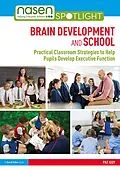Brain Development and School offers a range of practical classroom strategies to help pupils develop their executive function. Packed with useful tips that are grounded in theory, it examines how to support aspects of children's executive functioning that can affect their school life; including self-control, memory, metacognition, organisation, motivation, self-regulation and focus.
Relevant for pupils in the primary and secondary school, the book focuses on ways of improving children's emotional and intellectual development. It includes:
- Discussion of what executive functioning is and the different factors that might affect a child's executive functioning
- Ways that executive functioning weaknesses show themselves in school
- Support strategies for teachers and advice for pupils to improve specific areas of executive functioning
- Manageable solutions and modifications that can be applied within the mainstream classroom
- A self-assessment questionnaire that can be used as a starting point for discussion with pupils
This book will be beneficial to all teachers, school leaders and SENCOs looking to support their pupils by identifying and understanding the root causes of their behaviour. It recognises the important role that schools play in pupils' neurological development and suggests ways for schools to provide more personalised, differentiated support for individual pupils.
Autorentext
Pat Guy teaches in Eton College's Learning Centre, UK, and is a Specialist Member sitting on SENDIST Tribunals at HM Courts. She is the author of Keeping Minds Happy and Healthy and Transforming Reading Skills in the Secondary School with Routledge.
Klappentext
Brain Development and School offers a range of practical classroom strategies to help pupils develop their executive function. Packed with useful tips that are grounded in theory, it examines how to support aspects of children's executive functioning that can affect their school life; including self-control, memory, metacognition, organisation, motivation, self-regulation and focus.
Relevant for pupils in the primary and secondary school, the book focuses on ways of improving children's emotional and intellectual development. It includes:
- Discussion of what executive functioning is and the different factors that might affect a child's executive functioning
- Ways that executive functioning weaknesses show themselves in school
- Support strategies for teachers and advice for pupils to improve specific areas of executive functioning
- Manageable solutions and modifications that can be applied within the mainstream classroom
- A self-assessment questionnaire that can be used as a starting point for discussion with pupils
This book will be beneficial to all teachers, school leaders and SENCOs looking to support their pupils by identifying and understanding the root causes of their behaviour. It recognises the important role that schools play in pupils' neurological development and suggests ways for schools to provide more personalised, differentiated support for individual pupils.
Inhalt
Chapter 1. What is Executive Functioning?
Chapter 2. Who is at risk and why
Chapter 3. Action: an individual's ability to monitor and regulate their activity
Chapter 4. Activation: the organisation of tasks
Chapter 5. Effort: the pupil's ability to regulate and sustain their effort and motivation
Chapter 6. Emotion: managing frustration and modulating feelings
Chapter 7. Focus: finding, sustaining, and shifting attention as required
Chapter 8. Memory: using working memory and accessing recall
Chapter 9. Child development: formal learning, play, risk taking and physical exercise
Chapter 10. Self-assessment questionnaire
